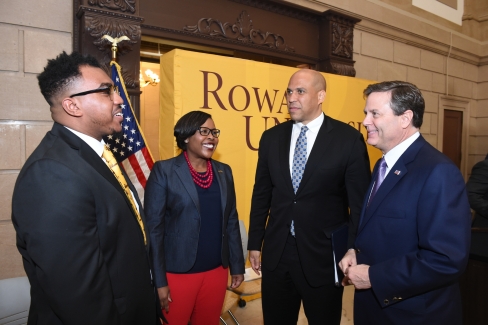At Rowan’s Camden campus, Booker, Norcross outline legislation to address teacher shortages
At Rowan’s Camden campus, Booker, Norcross outline legislation to address teacher shortages

Joined by educational leaders at Rowan University and throughout the state, U.S. Sen. Cory Booker and Congressman Donald Norcross outlined the STRIVE Act, legislation they’ve introduced to address teacher shortages, during an event at the University’s Camden Academic Building on Thursday, March 29.
Rowan President Ali A. Houshmand, College of Education Dean Monika Williams Shealey, NJEA Associate Director of Government Relations Sean Hadley, AFT Local 2373 Vice President II Amy Woodworth, Camden Mayor Francisco “Frank” Moran, and Rowan education major Marcus King joined Booker and Norcross in voicing support for the STRIVE Act during the event.
An acronym that stands for Supporting the Teaching Profession
Through Revitalizing Investments in Valuable Educators, the STRIVE
Act is led by Booker in the Senate and Norcross in the House. It
includes several provisions to help address teacher shortages in
New Jersey, including increased investments in teacher preparation
programs and financial assistance to encourage diversity in the
teaching profession.
According to the legislators, the act would:
- Mandatorily fund and increase funding for programs that prepare and train educators to be their most effective, while allowing early childhood educators to participate in the program;
- Overhaul the current loan forgiveness program for teachers in Title I schools to provide incremental and complete loan forgiveness to teachers that teach for seven years while “grandfathering in” teachers that have taught longer but are still paying student loans;
- Encourage diversity in the teaching profession by providing financial assistance for teaching certification and licensing fees to low-income and other underrepresented communities; and
- Increase the teacher tax credit from $250 to
$500 and to $1,500 in the case of an eligible educator teaching in
a high need school.
In discussing the bill, speakers noted that approximately 17
percent of teachers leave the profession after five years. The most
significant impact of that happens in high-poverty, high-minority
schools, which often have difficulty in hiring and face high
turnover partly because of inequitable school funding and
inadequate resources.
Other countries understand that the more you support teachers, the
more the nation succeeds, Booker said, noting that enrollment in
teacher preparation programs has dropped by a third
nationally.
“The most critical thing we can do right now is empower teachers,”
the senator said. “Teachers are pillars of our communities.”
“The STRIVE Act means peace of mind for educators across the
country and will encourage our best and brightest teachers to serve
in high-needs areas, so all our kids can benefit from a great
education,” said Norcross, adding that the bill “reinforces
what we as a nation believe in—educators and teachers.”
Houshmand said passage of the bill would chart the future of
America. He added that schools around the nation especially need
STEM educators from underrepresented populations.
Through numerous programs, Rowan’s College of Education is working
to address those issues, noted Shealey, a former special education
teacher. The College of Education has educated teachers and
educational leaders for more than 90 years.
On average, teachers spend $600 annually out of their own pockets
on classroom supplies, clothing and even food for their students,
according to Booker. The legislation’s proposed tax breaks for
teachers would help address that, the senator added.
“This issue is personal to me,” Shealey said. “I was one of those
teachers who paid for supplies, who took kids to after-school
programs, and bought meals. The STRIVE Act is rooted in policies
that work.”
King, a sophomore health and physical education major, is a member
of the inaugural class of Rowan’s Project IMPACT (Increasing Male
Practitioners and Classroom Teachers), a recruitment and retention
program for diverse males pursuing careers in education.
Passage of the legislation “would make the path for aspiring
teachers like me a little easier,” King said.
“Higher education is expensive and if we want people to move into
this profession, we need to make the salary better when teachers
graduate. We should not be starting our careers with a lot of
debt.”
Even with the challenges teachers face, King said he’s anxious to
get into the classroom. He was mentored, he said, by many teachers
and coaches from kindergarten through to his years at Rowan.
“My teachers pushed me and believed in me,” King said. “My goal as
I pursue teacher leadership is to help future generations of
students find their passion as they create their own journey
through life.”
